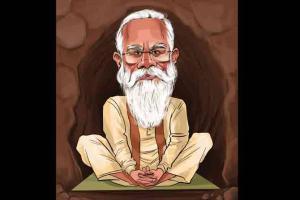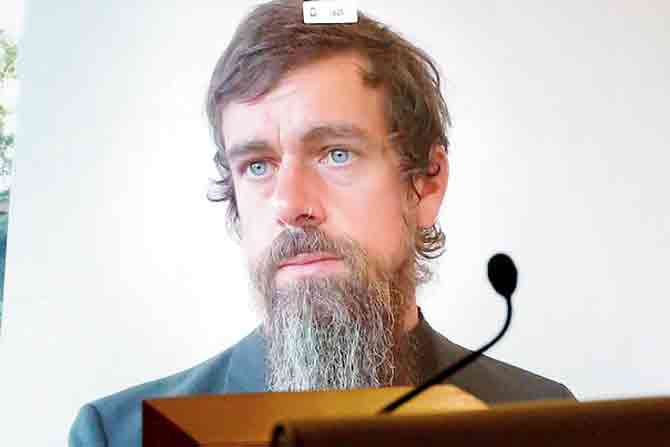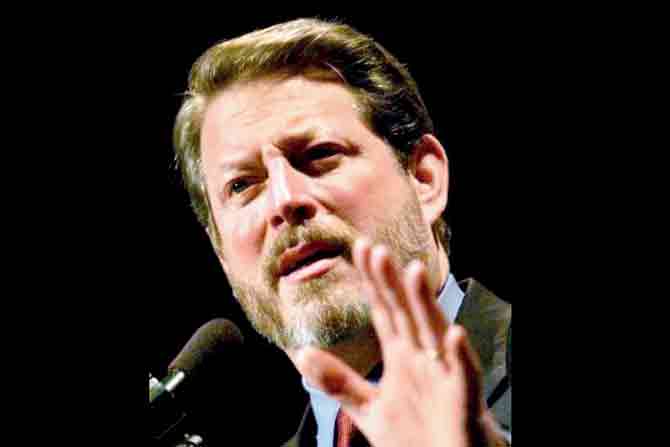As Twitter buzzes with memes about PM Narendra Modis quarantine beard, men who have experimented with facial hair, discuss the sociology, psychology and politics of it

Narendra Modi. Illustration/ Uday Mohite
In late March, when Indian Prime Minister Narendra Modi appeared on television screens, beseeching citizens to follow lockdown rules to prevent the spread of the Coronavirus infection, he sported the usual, grey, well-groomed beard. Last month, during a televised address where he asked fellow Indians to fight COVID-19 fatigue, the stubble had grown into a long beard, curling at the fringes.
Sure enough, Twitter went into a tizzy with memes and GIFs in reaction to the PM's "quarantine beard". While some compared him to professor Albus Dumbledore from the Potter series, others dubbed him plain "badass".
ADVERTISEMENT

Jack Patrick Dorsey
There seems to be a pattern, observers say. Jack Patrick Dorsey, technology entrepreneur and co-founder and CEO of Twitter, created a similar stir recently while he faced a Senate panel over a censorship matter. He was compared to the infamous Russian mystic Rasputin, and even Tom Hanks' character in Castaway.
While the pandemic may seem reason enough for men to socially distance themselves from their razors, there's more to facial fuzz, say experts. In his 2017 book, Of Beards and Men: The Revealing History of Facial Hair, Christopher Oldstone-Moore argues that today's bristled resurgence is linked to a centuries-long cycle of changing ideals of masculinity. "The history of men is literally written on their faces," writes the Ohio-based senior lecturer at Wright University. His interest in the subject was born when he was teaching European history, 20 years ago. "I was looking into aspects of social history that might interest my students and discovered that there was no historical scholarship on facial hair," he tells Mid-day in an email interview.
"I realised that in recent years, there has been a great deal of thought and study of gender and body in history, and now would be a good time to reconsider the question of facial hair."
One of his key arguments is that every society in history has established an authoritative style, which indicates a man's adherence to the standards of masculinity for his time and place. "If that is shaving, as it usually was in Western European history, the beard could serve as a protest alternative, such as in the 1830s or the 1960s, or with hipsters of the early 21st century. The authoritative standard will occasionally shift when there is a major change in the way masculinity is defined. For example, beards became normative in 16th century Europe when Renaissance society emphasised a more worldly and natural form of manliness. The same happened in the late 19th century." According to him, beards are more common today as contemporary society rethinks masculinity.

Al Gore
Interestingly, the beard has also been associated with coping mechanisms. US website Vox coined the phrase "crisis beard" to define the moment when a man forgoes shaving during a crisis, so that others around him know that he is fully engaged in resolving it. Instances that support the argument are plenty. After his defeat in the presidential campaign in 2001, Al Gore reappeared with a full grey beard, flailing red flags about climate change. Conan O'Brien, too, ditched his beard after a short and disastrous stint with The Tonight Show. Closer home, former Jammu and Kashmir's CM and National Conference working president Omar Abdullah had decided not to shave until he is released from detention. He was put under house arrest by the state administration in September last year after the Central government revoked Article 370 of the Constitution.
Protest or countercultures can adopt facial hair to distinguish themselves from the mainstream, thinks Moore. "The most short-term phenomenon is what I call the 'quest beard,' also described as a crisis beard. This is when the basic standards do not change, but men change their style according to special time." He calls it "quest beard" because it is often associated with achieving a goal. "A sports team might grow beards in pursuit of a title, until the quest is over. A COVID beard is to endure the struggle and challenges of the pandemic. The idea is that the beard will be gone when the crisis is over. It works well because beards are typically associated with toughness and natural strength."
Not everybody is willing to wield the razor on achieving their goal, though. Mumbai-based barber Darshan Yewalekar, who styles actor Ranveer Singh, has been Instagramming his transformation from a clean-shaven man to one with a chest-length beard. "I was doing well professionally, but between 2009 and 2012, my career nosedived," he remembers. Driven to find his "ikigai", Yewalekar started digging into the history of barbering and travelled to Europe and London to understand the science behind hair growth. "Sometimes, it's more than just style and can also be a sociological identifier. For instance, men in certain ultraorthodox Muslim sects often keep their upper lip clean-shaven. Their beards cannot be more than the size of their wrist when they hold it." He says in Afghan culture, beard checks are conducted by holding a muslin cloth under the beard. If the bristles penetrate the cloth, it means you've cut the beard.
 Darshan Yewalekar - Owns a barbershop in Bandra, and is actor Ranveer Singh's stylist "My waist-length beard inspires confidence among customers. They feel they can trust me with their beard"
Darshan Yewalekar - Owns a barbershop in Bandra, and is actor Ranveer Singh's stylist "My waist-length beard inspires confidence among customers. They feel they can trust me with their beard"
Fascinated by what he learnt, Yewalekar began to experiment with facial hair. "There were phases when I was mistaken for a homeless man, but I kept at it," he laughs. Today, he is a mascot for his barbershop in Bandra, and has a beard that nearly reaches his waist. He believes his look inspires confidence in his clients. "It's almost like seeing a gym instructor with a six pack. You get the impression that he knows his shit. In this case, I do." It's not uncommon for people to come up to him and admire the length, ask him for tips. He even gets the occasional, "may I touch it?" request.

Raamesh Gowri Raghavan
Studies suggest that the beard evolved through a complex process of sexual selection. According to evolutionary biology, traits evolve in different species depending on how the opposite sex sees them, says Raamesh Gowri Raghavan, researcher at INSTUCEN Trust, studying historical anthropology, archaeology and history of art. To support the argument, Raghavan gives us the example of a peacock's extravagant tail fan that has no proven benefit for its physical survival. "In fact, it's more of a hindrance. It doesn't help him fly or escape predators. The messaging is that a male who is able to spend so much energy on growing the tail, and still be alive, is sure to be robust and healthy for the pea hen to mate." In humans, therefore, the logic is that a man with bountiful facial hair is strong and dependable. "For generations, the beard has signified age and experience and, therefore, helps project a sense of authority. The longer your beard, the older you were. When a man is clean shaven, he's seen as young and inexperienced. Beards project wisdom," explains Raghavan.

Justin Trudeau
Moore points to Canadian PM Justin Trudeau's new look, suggesting that he grew a beard when he was hit by a scandal, and was under heavy political pressure. "It was meant to show that he was tough and would endure. The Canadians I talked to thought that made sense."

Bony Sasidharan
Biker and travel blogger Rohith Subramaniam says that his anecdotal research has proven that it is not in everyone's DNA to grow a beard. Six years ago, he got 85 people and six brands, including a beard oil brand, to fund his travels across India. "I call it the beard privilege. Many men from China, Thailand, Japan, and the surrounding Asian countries seem to have weaker growth of facial hair. They envy men with facial fuzz. A beard essentially inspires different emotions in different cultures." Bony Sasidharan, national key accounts manager at Schwarzkopf Professional, recalls a trip to Shanghai for a hairdressing award. "I was the only one with a long beard. People were coming up to me and taking pictures in groups. I felt like a celebrity," he laughs. The most challenging situation if you sport facial hair, though, is securing a clearance at the immigration counter, while travelling to an international destination. "I get a lot more questions compared to other passengers."
.jpg) Sahil Arora - Founder, Method Art Space. Stopped shaving when he quit his corporate job in 2009
Sahil Arora - Founder, Method Art Space. Stopped shaving when he quit his corporate job in 2009
Creative, fashion, and art-focused fields are all about the scruffy look, says gallerist Sahil Arora, gallerist and founder of Method Art Space. He has had a beard for 11 years and stopped shaving when he quit his corporate job in 2009. It was a way of "breaking free" from the "must haves" and diktat, he tells us. "I always found shaving a colossal waste of my time so when it wasn't required, I stopped doing it."

Siddharth Sirohi, designer and founder of Baro Design
Siddharth Sirohi, designer and founder of the furniture design studio Baro Design, says beards add "a sense of gravity". "You get taken more seriously, especially if it's not too manicured. A thick natural beard is a non-vain way of vanity." But maintaining it is anything but easy. "At times, your skin itches like hell. You often get confused whether to shampoo or soap it. It also becomes a fidget toy. Eventually though you make peace with."
 Aditya Rajadhyaksha -Co-founder, Playydate, and director at Quest Consolidated Services Pvt. Ltd. Has to maintain a clean shave most days because work demands it
Aditya Rajadhyaksha -Co-founder, Playydate, and director at Quest Consolidated Services Pvt. Ltd. Has to maintain a clean shave most days because work demands it
In the corporate world, change is brewing slow. Aditya Rajadhyaksha is the co-founder of Playydate, an online marketplace for kids' skill-based classes. and director at Quest Consolidated Services Pvt. Ltd., a marketing and trading organisation. He says it's tricky negotiating a beard in his profession. On most days, he has to maintain a clean shave, because work demands it. "When I choose to keep a beard, the reactions range from 'are you in creative mode', or 'lazy' or having a 'hard day' at work or too much 'pressure'. While I feel a clean shave makes me feel more confident and approachable, there's no reason why can't I be at the top of my game and with a beard. That said, we are now slowly moving towards a world where beards are becoming more acceptable in both formal and informal business settings. It's being seen as an assertion of choice." Moore says shaving is usually understood as adherence to codes of proper manhood, and to discipline in general.

Christopher Oldstone-Moore
Body hair rules, incidentally, are less forgiving when it comes to women. Manisha Lakhe, poet, film critic and the founder of Caferati—an online writers forum which hosts Mumbai's oldest open mic event, says women, were brought up to be 'hairless'. "Hair has always dictated ideas about manliness and beauty. Women have had to pluck, wax, and go through a lot of pain to look desirable and feminine. Ancient Greeks thought women who could 'sit on their hair' were the most beautiful. Basically, long hair meant good health." She believes social media has only made matters worse. Memes about Julia Roberts' armpits and Anil Kapoor's chest hair tickle the Internet. "Perhaps it's time we also ask why women across the world who are homebound are high-fiving each other. Is it because they have 'ditched their bras'?"
The unifier on Instagram
Uttarakhand-born graphic designer Kishor Singh Bisht started an Instagram page called the Beard Club India to build a community. The account has over 8k followers and doubles up as a platform for brands to scout for 'bearded talent'. "My objective is to make the beard a culture rather than a passing fad. We have people from urban and rural pockets, and across communities and cultures who contribute to the page. At a time when there are so many divisive forces at work, this simple feature is helping bring us together," he says.
Brands are riding the wave
According to reports, the male grooming market in India was valued at R140.50 billion in 2018, and is expected to reach R319.82 billion by 2024. The potential inspired Ahmedabad-based Aakash Goswami, who runs a real estate business, to start Whiskers, a luxury grooming product line for men, with partner Rannvijay Singha. Currently, they have over 20 products in their portfolio. "The trend has moved from #NoShaveNovember Challenge to no shave all year. And because it's not easy to grow and be itchy and patchy, beard oils and moisturisers are seen as essentials." He says, the beard, over time, becomes a part of the wearer's identity. "We tend to think that women play with their hair. But bearded men like doing it too. Stroking the fuzz becomes second-nature. If we were on a video call, I'm sure you'd ask me to stop playing with it."
Keep scrolling to read more news
Catch up on all the latest Mumbai news, crime news, current affairs, and a complete guide from food to things to do and events across Mumbai. Also download the new mid-day Android and iOS apps to get latest updates.
Mid-Day is now on Telegram. Click here to join our channel (@middayinfomedialtd) and stay updated with the latest news
 Subscribe today by clicking the link and stay updated with the latest news!" Click here!
Subscribe today by clicking the link and stay updated with the latest news!" Click here!






